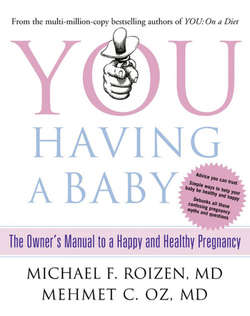Читать книгу You: Having a Baby: The Owner’s Manual to a Happy and Healthy Pregnancy - Michael Roizen F. - Страница 54
Holy Molar
ОглавлениеSevere nausea isn’t associated with just roller coasters and frat parties. Severe nausea can also be a sign of something called a molar pregnancy. This occurs when those chorionic villi (the coral reefs from the last chapter) swell and keep functioning as if there were a fetus—even when there is no viable fetus. A molar pregnancy, which can spread beyond the uterus like a cancer and also cause heavy bleeding, can be detected by an ultrasound and treated with a small surgical procedure called a D&C (dilation and curettage) to remove the excess tissue from the uterus.
As is the case with most things body related, there may be a very good reason humans developed morning sickness in the first place. During a time when people ate a lot of raw food that could carry bacteria, nausea—which typically occurs in the first trimester, when the baby is most vulnerable—helped the developing fetus avoid exposure to potential toxins, since the mother would likely be able to tolerate the poisoning, while the child might not. If mom was too sick to eat or could stomach only simple, bland food, it reduced the fetus’s chance of being exposed to food-borne illness. Basically, it was better for mom to be nauseous than for the pregnancy to be terminated. Even today, women who experience morning/afternoon/evening sickness are less likely to miscarry than women who do not. It’s a harsh reality, but it’s one of the many ways that our bodies do what we like to call biological budgeting: protecting the life of the baby at the expense of the mother’s comfort.
The true biological reason why pregnant women feel and get sick isn’t fully understood. It seems that something in the vomiting center of the brain (didn’t know you had one, huh?) is stimulated during pregnancy to induce nausea. (See figure 3.3.) In addition, morning sickness may be linked to higher levels of estrogen and/or the high level of the hormone hCG in early pregnancy. Plus, during pregnancy, the digestive tract relaxes, which makes the muscles guarding reflux from your stomach to your esophagus less efficient, causing an increased flow of acid from your stomach into your esophagus. All those factors and the heightened sense of smell you’ll
Figure 3.2 Seeing Sickness If you’re experiencing nausea associated with pregnancy, a couple of things could be happening. The vomiting center in your brain is more sensitive and your digestive tract is more relaxed, making it more likely that foods will travel up as well as down. A number of foods can help you fight through the nausea and give your baby the needed nutrients. Tip: Try cold ones, as opposed to hot foods (hot foods heighten your sense of smell). And hang in there; it usually passes by the end of the first trimester.
